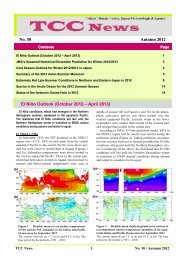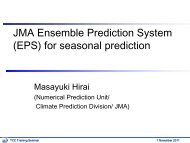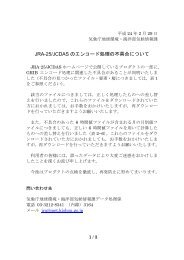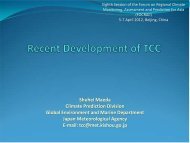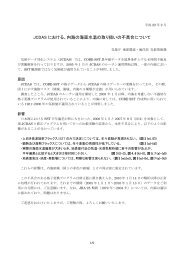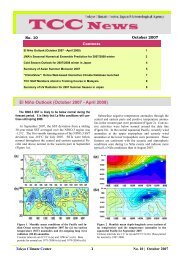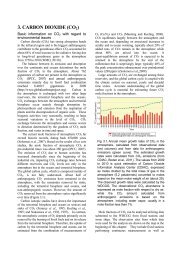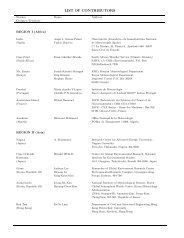TCC News No. 25
TCC News No. 25
TCC News No. 25
Create successful ePaper yourself
Turn your PDF publications into a flip-book with our unique Google optimized e-Paper software.
normals (Figure 11). This may be associated with global<br />
warming and decadal-scale variability. It should be<br />
noted that air temperatures for the stratosphere in the<br />
present normals include a negative bias because such a<br />
bias is seen in JRA-<strong>25</strong> stratospheric temperature data for<br />
the period between 1979 and 1998 (JMA 2007).<br />
Reference<br />
JMA, 2007: New climatological normals based on the JRA-<strong>25</strong>.<br />
Monthly Report on Climate System Separated Volume<br />
<strong>No</strong>.13, 139 pp.<br />
Onogi, K., J. Tsutsui, H. Koide, M. Sakamoto, S. Kobayashi, H.<br />
Hatsushika, T. Matsumoto, N. Yamazaki, H. Kamahori, K.<br />
Takahashi, S. Kadokura, K. Wada, K. Kato, R. Oyama, T.<br />
Ose, N. Mannoji and R. Taira, 2007: The JRA-<strong>25</strong> Reanalysis.<br />
J. Meteor. Soc. Japan, 85, 369-432.<br />
(Shotaro Tanaka and Hiroshi Ohno,<br />
Climate Prediction Division)<br />
Figure 11 Differences between JMA’s new and old normals<br />
of 850-hPa temperature (left: January; right: July)<br />
The shading indicates deviations of 850-hPa temperature for the<br />
new normal from that for the old normal. The contours show<br />
850-hPa temperature for the new normal.<br />
The GFCS at the Sixteenth World Meteorological Congress<br />
The Sixteenth World Meteorological Congress (Cg-XVI)<br />
was held in Geneva, Switzerland, from 16 May to 3 June,<br />
2011, with the participation of more than 600 delegates,<br />
including senior government officials, heads of National<br />
Meteorological and Hydrological Services (NMHSs), and<br />
representatives of WMO partner organizations. One of the<br />
key issues at Cg-XVI was the establishment of the Global<br />
Framework on Climate Services (GFCS), which was proposed<br />
by the World Climate Conference-3 (WCC-3) (held in<br />
Geneva from 31 August to 4 September 2009) (see <strong>TCC</strong><br />
<strong>News</strong> <strong>No</strong>. 21 (Summer 2010)). The congress decided that<br />
the framework would be one of the top five priorities of<br />
WMO over the next four years. The GFCS implementation<br />
plan will be developed by the WMO Executive Council<br />
for review and adoption at a 2012 extraordinary session of<br />
the World Meteorological Congress, which all relevant<br />
stakeholders (including UN bodies) are expected to attend.<br />
In order to provide comprehensive and coherent information<br />
on the various components of the GFCS to congress<br />
delegates, a series of six interconnected side events on the<br />
theme of “The Role of NMHSs within the Global Framework<br />
for Climate Services (GFCS)" was organized. One<br />
of these events, entitled “Facilitating the Flow of Climate<br />
Information,” introduced the coordinated Climate Services<br />
Information System (CSIS). This is a system to protect<br />
and distribute climate data and information according to the<br />
needs of users and according to the procedures agreed by<br />
governments and other data providers, and comprises<br />
global, regional and national centres and entities that generate/process<br />
climate information (Figure 12). This event<br />
was held on the evening of 20 May, 2011, and was moderated<br />
by Dr Richard Graham from the UK Met Office. As<br />
one of three lead speakers, <strong>TCC</strong> Head Ms Teruko Manabe<br />
gave a presentation on regional aspects of CSIS, including<br />
the activities of Regional Climate Centres (RCCs) and Regional<br />
Climate Outlook Forums (RCOFs).<br />
Figure 12<br />
The three geographic domains<br />
(global, regional and national) and<br />
nodes in the CSIS<br />
<strong>TCC</strong> <strong>News</strong> 6 <strong>No</strong>. <strong>25</strong> | Summer 2011



